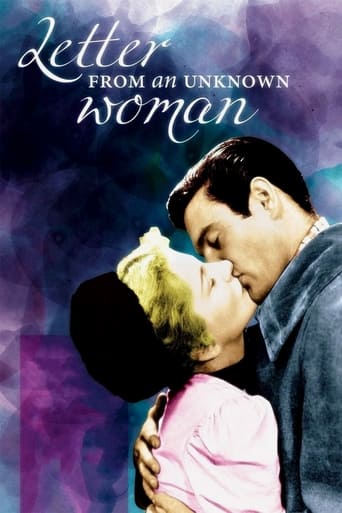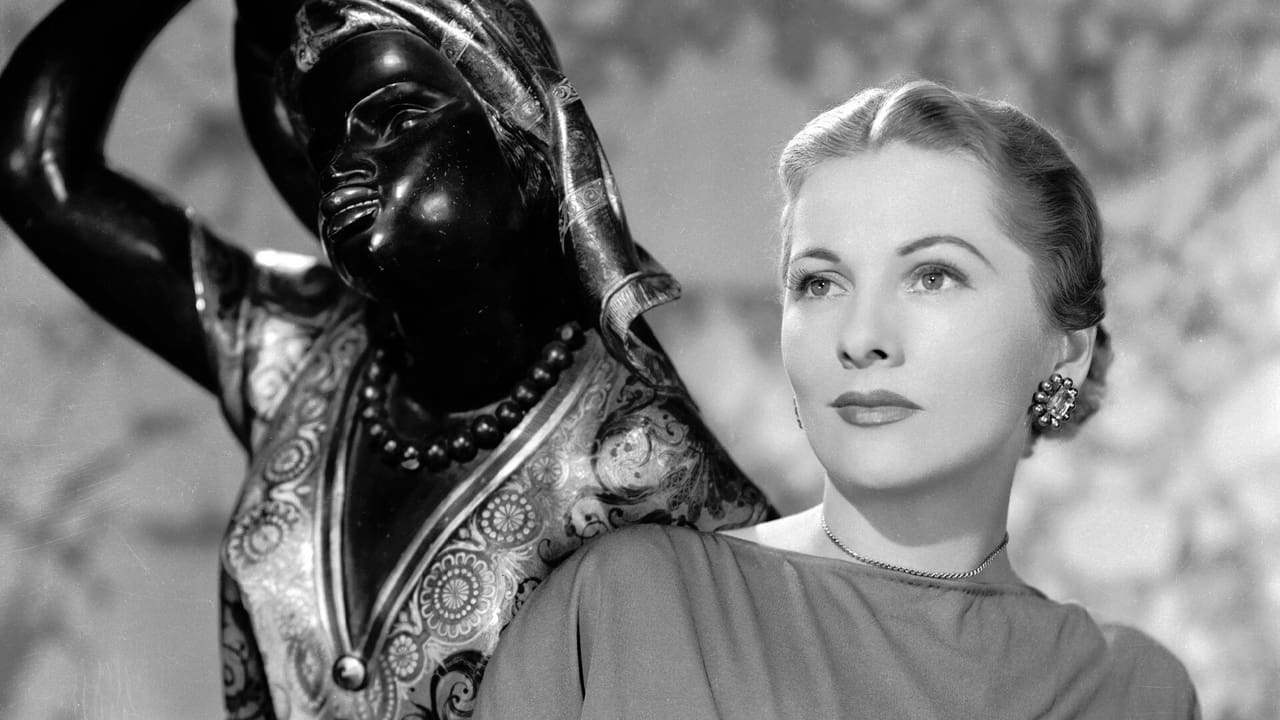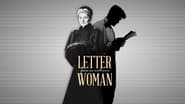gavin6942
A pianist about to flee from a duel receives a letter from a woman he cannot remember, who may hold the key to his downfall.What a very strange film. Although the title suggests the film is about a letter from an unknown woman, we spend most of the time following a woman and her love for a pianist. Is she connected to this letter? Is she the one dying in the hospital? And how is any of that related to the duel? Perhaps most strange is that although the film follows the original story very closely (from what I understand), it changes in one key instance: there is no duel in the original story, nor is there a character such as Johann. No duel? That is the big event lurking in the background of this entire story!
MisterWhiplash
Sometimes you watch a film dealing with the story of a romance and the filmmaker will be content enough to reside in the realm of melodrama, of heightened emotions serving a tale of doomed romance - or maybe it won't turn 'doomed' per-say, but the stakes are always so monumental, incredible and just downright heightened that some in the audience may need handkerchiefs for their un-dry eyes and noses. For Max Ophuls, going past melodrama was a key thing. The ingredients in Letter from an Unknown Woman certainly make up melodrama, and as I watched the film I thought it would just comfortably rest there. But it was in the last reel - and especially in the minutes after the end, where I could let my mind catch up with what I was feeling - that this is closer to grand opera, and it's by nature of how determined, how passionate and versatile Ophuls camera is. He is such an active participant, but by making us the audience as well, that it raises the stakes even higher. This is a fabulous but painfully sad movie.It concerns the (mostly) unrequited romance between Lisa (Fontaine) and Stefan (Jourdan), the latter being a concert pianist who comes to take a room with her family when she's younger. She sees him play, and see him with his swagger and confidence, and is smitten right away. Does she know really that much about him? Who cares? The piano seems to express how soulful, how achingly beautiful he is - but more than that how he is not quite happy with how far he's gotten (when he stumbles playing at one point, it seems like maybe he breaks something in disgust with himself - and later she comments on this to him, that he hasn't found what he's looking for). But she leaves with her family and she never gets to tell him who she is or how she feels. Until...But no, the letter that Stefan is reading from is not at this point, which he comes across in his room as he is plotting to run away from a duel with a man who is after him for such and such a reason (and suffice to say you'll figure it out after a while, perhaps). They do meet some time later, when she returns to Vienna and they share one of those perfect romantic evenings that people may have in real life as well as in the movies. Unlike earlier in the story when she's shy and reserved, here she does open up a little more (though in this first real date she won't say she was there during the time they shared living quarters), and he is about the most charming guy on the planet in that moment. It's the kind of date where, I suppose this was a thing in the early 20th century, they go for a buggy ride... with the backdrop being changed by operators.It's interesting to note that at first I didn't really notice that the backdrop was fake until the buggy first stopped. And for a split moment I wondered, 'hey, come on, can it be that cheap a production to... oh, wait, no, it's supposed to be fake.' Thinking about it more, this is kind of like a good metaphor for their relationship - it has the veneer of gorgeous scope and splendor, but when you look closer it's not real. Jourdan has to go away after their very brief whirlwind romance, and she is left with a baby. She gets married, and the story goes ahead to years later, when the child is older and Lisa is now married to a well-off man.Again, you can see many parts of this story I've just described have the air of melodrama: a woman pining for a man she may (or may not) be able to have, and that her passions take on another light when seen through the framing - the framing is the essential thing, what sets it up as being all about the 'hindsight-is-always-20/20' aspect - that you don't know what you got until it's gone. And of course Fontaine and Jourdan are so terrific in their roles, with the former beaming with young love in the early scenes (I almost didn't recognize her in the slightly 'lower-class' get-up), and on through the middle section with her and Stefan's date, and Jourdan is... well, kind of a matinée idol, almost too good looking, if that makes sense, like deceptively the perfect guy.A lot of the brilliance of the film comes down to its economy of storytelling - it's a brisk 83 minutes, though it doesn't feel too short while watching it - and that Ophuls is not one to ever keep things static. Even that buggy scene where they share a magical moment of connection in conversation and perhaps more, because of that backdrop we're not feeling as if this is something stagey or stolid. And yet I don't feel like the technique is there just to please Ophuls demands for a crane shot here or there or most places; the high style is there for the high emotions, that this is a woman expressing how she felt through much of her adult life, and the fact that this guy seemed to be caring for her but on a totally superficial level, and never for very long.Letter from an Unknown Woman is a tragedy of taking things for granted, of believing love at a certain level will be reciprocated, and the fluidity of style matches the fluidity of intense emotions that, when broken, become all the more gut-wrenching.
tomsview
There is nothing quite like unrequited love to focus the attention. As Somerset Maugham once said, "The love that lasts the longest, is the love that is never returned".And that is pretty much what this movie is all about. But what could have been a strange little movie about an unhealthy obsession instead becomes an unforgettable romantic masterpiece.The film is set in Vienna around 1900. Stefan Brand, a concert pianist played by Louis Jourdan in a role that perfectly suits his smooth good looks, receives a letter from a dying woman, Lisa Berndle, played by Joan Fontaine in a remarkable performance.In the letter, she pours out her love for him, which started when she was a young girl living in the same apartment building. Although she eventually left Vienna with her family, her love for Stefan never wavered.Years later, she returns to Vienna, and over a period of time has two brief affairs with him, although she realises that he has had affairs with many women and has forgotten her. She eventually marries an older man, but her love for Stefan blights her life and compromises her marriage. The film ends on a poignant note.The movie differs from Stefan Zweig's short story; it is as though the film adds flesh onto the bones of the original story - Stefan becomes a pianist instead of a novelist, and the filmmakers added the impending duel, which bookends the movie. The film is also set in an earlier period, which allowed for great use of gaslight, moody shadows and beautiful costumes. What a look this film has. Shot in black and white on mostly studio sets, it has a dreamlike quality that location shooting could never have achieved.The screenplay was by Howard Koch, and he deserves credit on two counts - he not only wrote the brilliant script, but also suggested Max Ophuls (spelt Opuls in the film's titles) for director.This may seem like sacrilege to some, but I think the movie has improved on Zweig's work. The short story has a lyrical quality, but it's very one note; the depth of Lisa's obsession is explored in detail, however it becomes repetitious; the ending is also far more uncompromising.In his autobiography, "As Time Goes By" Koch tells how Ophuls allowed him to finish the script unhindered, and then they tested every passage together to make sure it worked. Koch also praised Ophuls' mastery of the medium, which is evident in every scene.Koch also revealed that the studio, not fully appreciating what they had, cut the film heavily, which, in his opinion, actually made it seem longer because they cut out all the beautifully constructed connective material that made the film so seamless and flowing. Thankfully, Joan Fontaine and her husband, whose company produced the film, convinced the studio to restore the footage.Although it wasn't a success when first released, this haunting film is now recognised as a great work of cinematic art, and it repays every effort in seeking it out.
sandover
I guess Mr. Zweig had not read psychoanalyst Darian Leader's book "Why do women write more letters than they post?" when he put his pen down; or maybe, despite the different time zone he did and decided to invert and take things a bit too literally. To make things as concise as possible, what is one of the arguments of the book, is that women question the addressee more than men do, and something cannot be put down in a woman's love letter, that is why what the title says happens.Mr. Zweig opts for the grand gesture of having one woman writing arguably just one letter in her life and sending it despite all odds; it seems that in her case nothing is lacking, even if her obsession with her object of love has significantly broken down. Most of the viewers already know how the story goes, yet let's take a step back.In a nutshell, what we see on screen is the narrative of a life-long infatuation with a man from a woman on the brink of death: she tells the story of her life as seen from early womanhood to early middle age and as seen through her encounters with her at first neighbor and finally clueless stranger with whom she is totally in love and with no interruption, even though he does not recognize her and even though she has his child.This pure 19th century gazette schlock is nevertheless pursued by Ophuls with undiminished gusto, finesse as if wrenching up all embellishment and turn of rondo and waltz to make the film into some kind of march with head up into deadly melodrama; he gives this second rate story its glorious second fate on screen.I will be a bit more precise: I find Mr. Zweig an unbearable bore; to play it Viennese-style he knows not what sostenuto and what legato is: all comes flat in his hand, if one has read some of his books, with all the humanist alibi already cracking after WWI.What I mean by this is that we are only once involved actively and empathetically in the film, and that happens when Lisa for once (and for all) staggers into the truth that the great pianist she has always loved not only does not remember her, but is an almost senile Don Juan babbling the same old story from woman to woman, from one nightly routine to the next. And here we may admire the team work shining through: Fontaine passes a glimpse of pity and despair through the recognition of what Stefan really is, that is pity for him and a despairing self-esteem for her; Jourdan glides into his world-worn gags, and although he seems to me somewhat anxious throughout the film, he delivers a performance mixing up burdensome repetition and - what is truly great - making visible through his slightly lecherous character pity and terror.I am not so sure this stands for Fontaine; each time we see her older what strikes us is that her appearance is conceived in terms of visual metamorphosis, that is regarding age and lighting. Although there is a grand design in the conception, something is amiss when this steals the scene. It is also a case of involuntary irony when the male leader is the stealer as I think Louis Jourdan is and is supposed to be actually when you think of it, but maybe this is the crux of the matter: it is as if Mr. Zweig has stepped into the time when Don Juan cannot make his mechanisms go on, he suffers from repression, entering the Freudian era, courtesy of Mr. Zweig's friend Sigmund, that is why - as if the roles between old man and old world woman were inverted - his character is the one with the overflow of affected narcissism.All this may be great, but we do not have a book called "Zweig and his time", what we have is the definitive book on let's say what Vienna was about,"Hofmannsthal and his time" which presents us the extra spritzy operatic and far more complex ironies Mr. Zweig being a humanist/melodramatist lacks. If one has seen, say, "La Ronde" by the same Ophuls, after Schnitzler's (another Viennese) work, will recognize what the Viennese hell we are talking about the director and his actors simply being spontaneously tuned to such material.


 AD
AD




